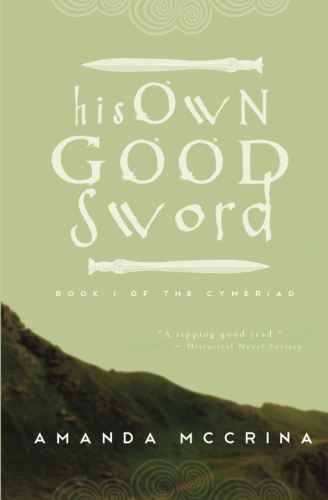If there’s an upside to my blogging hardly at all in the past month, it’s that all most of my blogging time has been devoted to my WIP (the rest to summer classes and the Stanley Cup playoffs). The second draft of Aquae is now over 30,000 words long. Here’s another excerpt for your enjoyment—at least, I hope it’s for your enjoyment! (Nb: the protagonist is now sixteen rather than ten.)

The jeweler came to meet me, wending his way importantly round the tables. The slave girl followed him. She seemed resentful I’d interrupted her work: she stood glaring at me over his shoulder, gripping her broom like a weapon.
“Well?” said the jeweler, reaching me.
He was shorter than I, bird-like and bony, his gray hair and beard and brows wispy as swifts’ nests. He blinked up at me beady-eyed. For a moment I blinked back down at him, my mouth half open, taken aback at his brusqueness, and his straggly brows shot up as though he couldn’t believe my insolence. “Have you come here to gape like a fish? What’s your business, boy?”
“I—I’ve a piece to sell,” I said.
Under the weight of his critical eyes I drew the calfskin pouch from my tunic with unsteady hands. I loosened the drawstring and shook out the arm-ring and held it out to him wordlessly. He took it gingerly, careful not to touch me, as though there were some deadly poison might leach through my skin. He studied the ring, turning it round and round in his knobby hands. I saw his small, shrewd eyes going back and forth as he read the inscription. He looked sharply back to me.
“Who’s your master, boy?”
Clarity shot through me like a lightning bolt.
“No,” I said, “no, I’m not a—I mean, it’s mine. It was given me.”
“Given you, was it? By whom?”
“My father gave it me. That’s his name on it: Marius Cassius Viator. He’s a centurion with the garrison at Isca.”
“Your father,” said the jeweler. His black eyes were running all over my face. His fingers had closed tightly round the ring. “He gave it you and told you to sell it, did he? I’m not a fool, boy. You’ve taken this of your master and slipped off.”
“I didn’t take it,” I said, “and he’s my father.” Julius’ voice echoed at the back of my mind: but you’ve no way to prove it. Do you think he’d claim you before a court?
The jeweler said, “You’re of the Red People.”
“My mother was,” I said. “My father’s Roman. Shall I explain to you how—”
“You need explain nothing.” The jeweler’s voice was flat. “I understand. You took your master’s gold and ran. I understand it perfectly well.”
“Give it back if you don’t want it,” I said. I tried to say it carelessly, but fear was pounding in my chest now: he could have me down to the prison and the truth wrung out of me—whichever truth he wanted to hear, dependent upon how many drinks he bought the guard. A night in the questioning chamber and I’d say anything they wished me to say.
The thought had occurred to him, too, because he turned all at once to the slave girl and gestured sharply to the doorway.
“Bring Marcus, girl. He’s down to the wine shop. You—” he added to me, as the girl slipped past me and out into the street— “You stay where you are, do you hear? I’ll have—”
But I was already moving, my legs driven by sudden panic. I heeled and ducked through the doorway and broke into a frenzied run soon as I was clear, sluggishly for the piled snow. For a moment the jeweler’s voice was carried away behind me on the wind whipping down the row; then he was out in the street after me, yelling, brandishing the ring in his upraised fist. I overtook the girl, who’d turned to look back at her master’s shouting, and darted past her down into the alley just as a knot of men, roused from their wine bowls by the commotion, tumbled out from Celso’s.

 I'm a student, amateur historian, coffee connoisseur, movie buff, hockey fan, cat lady, and all-around nerd. I'm currently pursuing a degree in history and political science at the University of West Georgia. In my spare time, I write historical fiction and fantasy. My debut YA historical fantasy novel His Own Good Sword was released on 7 May 2013.
I'm a student, amateur historian, coffee connoisseur, movie buff, hockey fan, cat lady, and all-around nerd. I'm currently pursuing a degree in history and political science at the University of West Georgia. In my spare time, I write historical fiction and fantasy. My debut YA historical fantasy novel His Own Good Sword was released on 7 May 2013.


